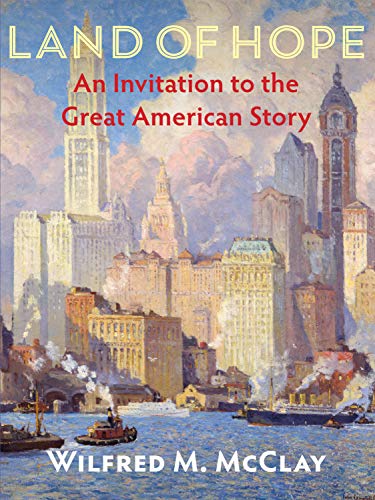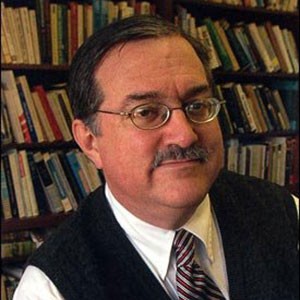Land of Hope: An Invitation to the Great American Story
By Wilfred M. McClay
JMC faculty partner and board member Wilfred McClay has published a new American history textbook that provides an alternative to the standard AP-level texts. In McClay’s words:
 We have a glut of text and trade books on American history. But what we don’t have is a compact, inexpensive, authoritative, and compulsively readable book that will offer to intelligent young Americans a coherent, persuasive, and inspiring narrative of their own country. Such an account will shape and deepen their sense of the land they inhabit, and by making them understand that land’s roots, will equip them for the privileges and responsibilities of citizenship in American society, and provide them with a vivid and enduring sense of membership in one of the greatest enterprises in human history: the exciting, perilous, and immensely consequential story of their own country.
We have a glut of text and trade books on American history. But what we don’t have is a compact, inexpensive, authoritative, and compulsively readable book that will offer to intelligent young Americans a coherent, persuasive, and inspiring narrative of their own country. Such an account will shape and deepen their sense of the land they inhabit, and by making them understand that land’s roots, will equip them for the privileges and responsibilities of citizenship in American society, and provide them with a vivid and enduring sense of membership in one of the greatest enterprises in human history: the exciting, perilous, and immensely consequential story of their own country.
The existing texts simply fail to tell that story with energy and conviction. They are more likely to reflect the skeptical outlook of specialized professional academic historians, an outlook that supports a fragmented and fractured view of modern American society, and that fails to convey to young people the greater arc of that history. Or they reflect the outlook of radical critics of American society, who seek to debunk the standard American narrative, and has had an enormous, and largely negative, upon the teaching of American history in American high schools and colleges.
This state of affairs cannot continue for long without producing serious consequences. A great nation needs and deserves a great and coherent narrative, as an expression of its own self-understanding; and it needs to convey that narrative to its young effectively. It perhaps goes without saying that such a narrative cannot be a fairy tale or a whitewash of the past; it will not be convincing if it is not truthful. But there is no necessary contradiction between an honest account and an inspiring one. This account seeks to provide both.
Purchase the book at Encounter Books or Amazon >>
From Imprimis:
“…Professional American historiography has made steady advances in the breadth and sophistication with which it approaches certain aspects of the past, but those advances have come at the expense of public knowledge and shared historical consciousness. The story of America has been fractured into a thousand pieces and burdened with so much ideological baggage that studying history actually alienates young Americans from the possibility of properly appreciating their past…
Land of Hope… goes against the current by not dumbing down the reading level. It is written with an underlying conviction that we should never sell short the capacity of young Americans to read challenging books if they are interesting and well-wrought. Such books are far more likely to stoke the fire of their imaginations and convey to them the complexity and excitement of history—history not as an inert recitation of facts, but as a reflective task that takes us to the depths of what it means to be human…”
Read McClay’s entire piece for Imprimis >>
From the Wall Street Journal:
“…Don’t ask [Wilfred McClay] who’s on the right or wrong side of history. He thinks those concepts are bunk. ‘History is only very rarely the story of inevitabilities,’ he says, ‘and it almost never appears in that form to its participants.’
Thus in the new book he observes that it’s ‘hard to read about’ early-19th-century America ‘without thinking of the series of events culminating in the coming of the Civil War as if they were predictable stages in a preordained outcome. Like the audience for a Greek tragedy, we come to this great American drama already knowing the general plot,’ and susceptible to the illusion that it was written in advance. He urges readers to resist ‘that habit of mind’ and remember that people at the time had no foresight to match our hindsight.
What gets him most riled up is what he sees as an abdication. ‘When you teach an introductory course in American history,’ he says, ‘you really have a responsibility . . . to reflect in some way the national story, in a way that is conducive to the development of the outlook and skills of a citizen—of an engaged, patriotic, serious citizen.’ Most professional historians don’t ‘take that mandate very seriously at all,’ and instead provide ‘a basically negative understanding of American history…’”
Read the full interview from the Wall Street Journal >>
 Wilfred M. McClay is the G.T. and Libby Blankenship Chair in the History of Liberty at the University of Oklahoma. His research interests focus on the intellectual and cultural history of the United States, with particular attention to the social and political thought of the 19th and 20th centuries, the history of American religious thought and institutions, and the theory and practice of biographical writing. A recipient of many teaching awards and honors, he has been the recipient of fellowships from the Woodrow Wilson International Center for Scholars, the National Endowment for the Humanities, and the National Academy of Education. Professor McClay previously served on the National Council on the Humanities, the advisory board for the National Endowment for the Humanities. His book, The Masterless: Self and Society in Modern America, won the 1995 Merle Curti Award of the Organization of American Historians for the best book in American intellectual history. Besides Land of Hope, he is the author of The Student’s Guide to U.S. History, Religion Returns to the Public Square: Faith and Policy in America, Figures in the Carpet: Finding the Human Person in the American Past and Why Place Matters: Geography, Identity, and Public Life in Modern America.
Wilfred M. McClay is the G.T. and Libby Blankenship Chair in the History of Liberty at the University of Oklahoma. His research interests focus on the intellectual and cultural history of the United States, with particular attention to the social and political thought of the 19th and 20th centuries, the history of American religious thought and institutions, and the theory and practice of biographical writing. A recipient of many teaching awards and honors, he has been the recipient of fellowships from the Woodrow Wilson International Center for Scholars, the National Endowment for the Humanities, and the National Academy of Education. Professor McClay previously served on the National Council on the Humanities, the advisory board for the National Endowment for the Humanities. His book, The Masterless: Self and Society in Modern America, won the 1995 Merle Curti Award of the Organization of American Historians for the best book in American intellectual history. Besides Land of Hope, he is the author of The Student’s Guide to U.S. History, Religion Returns to the Public Square: Faith and Policy in America, Figures in the Carpet: Finding the Human Person in the American Past and Why Place Matters: Geography, Identity, and Public Life in Modern America.
Professor McClay is a JMC board member.
Learn more about Wilfred M. McClay >>
![]()
![]() Follow us on Facebook and Twitter for updates about lectures, publications, podcasts, and events related to American political thought, United States history, and the Western political tradition!
Follow us on Facebook and Twitter for updates about lectures, publications, podcasts, and events related to American political thought, United States history, and the Western political tradition!
Want to help the Jack Miller Center transform higher education? Donate today.
